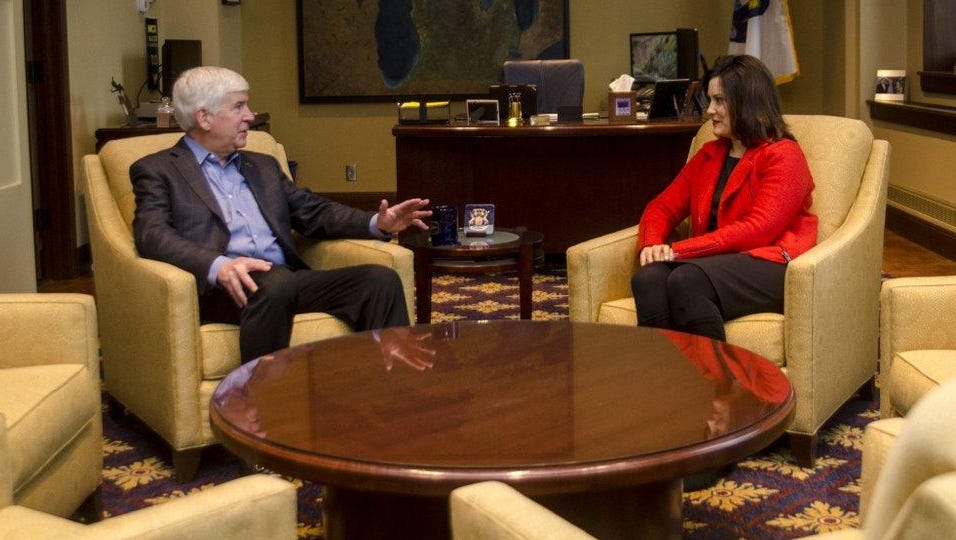Howes: Whitmer can win influential ally in business — if she wants one
 Daniel Howes
Daniel Howes
On the campaign trail, Gov.-elect Gretchen Whitmer promised to repeal the state’s right-to-work law, end the so-called “retirement tax” on public-sector pensions and reinstate the Prevailing Wage Law.
But realizing the political dreams of her supporters in organized labor ain't happening now with Republicans maintaining control of the Legislature, if with reduced majorities. That frees the next governor, a Democrat, to prove whether she’ll be a pragmatic ally of the business and philanthropic community.
She should be — because it's in the interest of the state and her political future to do so. Business leaders buoyed by the progress of the past eight years are more interested in maintaining economic momentum than once again fighting tired ideological battles producing confrontation and few real winners.
They see enthusiasm reshaping Detroit, thanks to billions in private-sector investment, pragmatic leadership in City Hall and a working relationship with the Snyder administration that should be continued, if not improved, by the next one. They know Michigan is more economically competitive today than it was when Rick Snyder took office almost eight years ago.
And they're more interested in the next governor showing she understands the mutual benefits of partnering with the business community than whether she has an "R" or a "D" after her name. Want proof that's true? Look no further than Mayor Mike Duggan, a powerful Democrat who knows his city's reinvention will lose traction if its generally pro-business attitude flags.
"The business community wants to be helpful," says Dan Loepp, CEO of Blue Cross Blue Shield of Michigan and an honorary co-chair of Whitmer's transition. "People want things to get better. There are problems that are still facing the state that we've got to deal with."
The results of Tuesday's election mean Whitmer, a former state Senate minority leader, will be limited by the political realities of a Republican House and Senate. And that means the new governor will be forced to focus on issues of mutual political interest if she wants to get anything meaningful accomplished.
"If you're motivated to get things done for the good of the state, you're required to head more for the middle," says Doug Rothwell, CEO of Business Leaders for Michigan. "There's every reason to believe we can make progress on issues that both parties have an interest in."
Topping the list are "the damn roads" of Whitmer's relentlessly repetitive conjuring. She wisely made them a centerpiece of her campaign, understanding that a) the sorry state of Michigan's roads and infrastructure affect just about everyone, irrespective of party or income, and b) voters know fixing them ain't free.
"We feel that more revenues are needed," Rothwell says of the road funds already earmarked for repairs. "The business community could be her ally."
Exactly right — on roads, on education, on worker training, on focusing economic development efforts on technology and investment tied to the next-generation auto industry of mobility, autonomy and electrification.
The ideological purity so fervent on the fringes of the right and the left is very much alive. It's not fertile ground for the kind of policy compromise that pragmatic business leaders seek to improve competitiveness, to nurture and recruit talent, to recast a narrative of decline.
The nominally political Snyder learned that lesson the hard way; his predecessor, Jennifer Granholm, arguably never did. Whitmer — the most experienced legislator to be elected governor since John Engler 28 years ago — knows better, thanks especially to her years working in and leading the Senate minority.
It's too soon to know just what Whitmer may have promised supporters on her way to the governor's office, or how any of those pledges may shape her political posture and priorities on business and economic competitiveness issues.
But it's not too soon to know that when Whitmer takes the oath of office on Jan. 1, she will inherit the strongest Michigan economy in decades. It's the product of a continuing national economic recovery, a restructured auto industry generating solid profits and more business-friendly policies in Detroit and Lansing.
She'll also get a Michigan business community generally conditioned to work with the governor's office — Business Leaders for Michigan, the Detroit Regional Chamber, the CEO group with no name led by DTE Energy Co. CEO Gerard Anderson.
All she has to do is ask. And remember that some very influential people will be listening very closely to what she says — and does.
daniel.howes@detroitnews.com
(313) 222-2106
Daniel Howes’ column runs Tuesdays, Thursdays and Fridays. Follow him on Twitter @DanielHowes_TDN, listen to his Saturday podcasts, or catch him 3 and 10 p.m. Thursdays on Michigan Radio’s “Stateside,” 91.7 FM.